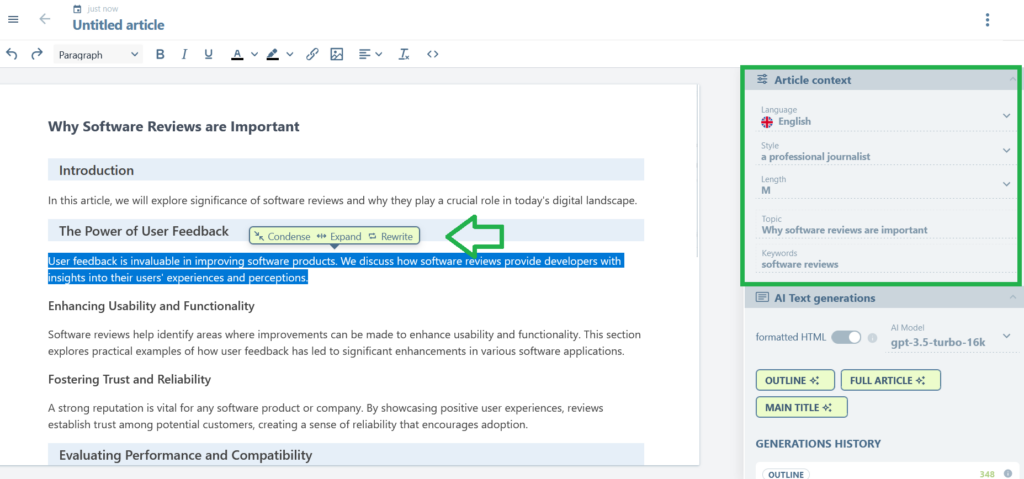
Elevate Your eCommerce Game: Essential AI Tips, Tools & Tactics
In an incredibly competitive digital world, eCommerce businesses must continually innovate to stay relevant and ahead of their competition. One way they can achieve this is by leveraging Artificial Intelligence (AI) tools and tactics. In this blog post, we will explore the significant benefits that AI for eCommerce can deliver. Whether you’re selling on Amazon or using Shopify, these tactics will help you drive more business.
The Power of AI in eCommerce
Artificial Intelligence has revolutionized various sectors across the globe, but its impact on the world of eCommerce is particularly profound. From copywriting to image creation, personalized shopping experiences to efficient inventory management and beyond, AI serves as a powerful tool for online retailers looking to elevate their operations.
AI Copywriting
Using an AI copywriting app like Article Factory can be a game-changer for your ecommerce business, offering a slew of benefits that extend beyond mere time-saving. First and foremost, the app can generate high-quality, SEO-optimized content in a fraction of the time it would take a human writer, significantly boosting your productivity. This rapid turnaround enables you to frequently update your website, blog, or product descriptions, keeping your content fresh and engaging.

Moreover, AI algorithms can analyze data to determine what kind of content resonates with your target audience, allowing for more personalized and effective messaging. Creativity also gets a substantial uplift. While AI can generate the groundwork for your content, you can focus on adding the finishing creative touches, ensuring that your brand voice shines through.
This harmonious blend of AI and human input can drive more traffic to your site, enhance customer engagement, and ultimately increase sales, making it an indispensable tool for scaling your ecommerce business. Our clients love the interactive editing feature. “Condense – Expand – Rewrite“ allows you to dive deeper into customization with our dynamic text editing feature. Whether you want to trim down content for a concise read, expand on a topic for a detailed exploration, or simply give a section a fresh spin, this tool empowers you. Simply highlight your desired section of the article and choose to condense for brevity, expand for depth, or rewrite for a new perspective. Fine-tune your content to perfectly align with your vision, effortlessly.
AI Image Creation
The advent of AI-based image creation tools like DALL-E, Midjourney, Canva, and Adobe’s AI features has revolutionized the field of graphic design and visual content creation. These tools provide a suite of capabilities that significantly cut down the time and effort required to generate eye-catching, high-quality visuals.

- For instance, DALL-E can produce stunning, imaginative images based on simple text prompts, thereby expanding the boundaries of creative exploration.
- Midjourney focuses on automating complex tasks in video and image editing, thus freeing designers to focus on conceptual work.
- Canva offers AI-based design suggestions, speeding up the design process for both novices and experts.
- Adobe’s AI capabilities like Sensei offer advanced object recognition and automation features, making tasks like photo editing and enhancement quicker and more intuitive.
These tools democratize design, making it more accessible for people without a professional design background. Overall, they foster greater creativity, efficiency, and inclusion, allowing businesses and individuals to produce visually compelling content that stands out in today’s crowded digital landscape.
Personalizing Customer Experience with AI
Personalization stands at the forefront of successful retail strategies today. With access to vast amounts of consumer data and sophisticated algorithms capable of interpreting it accurately, businesses can create uniquely tailored shopping experiences that make customers feel valued and understood – all thanks to AI.
This kind of highly targeted marketing not only increases conversion rates but also fosters customer loyalty by making consumers feel seen on an individual level. This personalized touch is what distinguishes top-tier online retailers from their competitors.
Optimizing Inventory Management with AI
An optimized inventory system is crucial in ensuring smooth operations within any retail business—especially those operating digitally—and here too exists a compelling case for adopting artificial intelligence technologies into your workflow.
eCommerce companies often grapple with issues such as over-stocking or under-stocking products due to unpredictable market trends or inaccurate sales forecasting methods. But predictive analytics driven by machine learning—a subset of Artificial Intelligence—can analyze historical sales data alongside real-time market trends to provide more accurate forecasts about product demand, thereby reducing these risks significantly.
Detecting Fraudulent Activity Through Machine Learning
Beyond improving internal processes like inventory management or personalizing user experience through algorithmic recommendations; another fascinating application area for artificial intelligence in e-commerce lies within fraud detection.
Fraud attacks are becoming increasingly common occurrences in online commerce platforms due largely because they present enticing targets for cybercriminals who seek out vulnerabilities exploit them mercilessly without fear repercussion since perpetrating crime remotely often difficult track down prosecute properly so smart enough stay one step ahead authorities while continuously refining techniques adapt ever-changing technological landscape harnesses power predict likely fraudulent transactions before happen thus protecting both consumers store owners alike devastating financial losses associated these crimes.
A Glimmering Future: The Role Of AI In The Evolution Of Ecommerce
In looking ahead, it’s clear that Artificial Intelligence has a bright and pivotal role in the future evolution of eCommerce. The rapid advancement of AI technologies is continually pushing the boundaries of what online retailers can accomplish, extending far beyond personalized customer experience and optimized inventory management.
One key area where we’ll see AI make significant strides is within chatbots and virtual assistants. Leveraging the power of natural language processing (NLP) – an aspect of AI that allows machines to understand human language – these digital helpers will become ever more sophisticated in answering queries, guiding product selection, or even upselling related items to customers. Moreover, Augmented Reality (AR) powered by AI can also offer transformative experiences for online shoppers. Imagine being able to virtually ‘try on’ clothes or see how furniture might look in your living room before making a purchase decision – all from the comfort of your own home!
Not only does this create a uniquely engaging shopping experience but it also helps reduce return rates due to incorrect sizing or appearance issues. Furthermore, as we collect more data about each customer’s habits and preferences through machine learning algorithms combined with predictive analytics capabilities provided by artificial intelligence systems like deep learning models — another branch outgrowth comprised complex neural networks designed mimic human brain functionality— they’ll keep improving their ability deliver highly accurate insights into consumer behavior which ultimately enhance overall sales performance while reducing marketing costs associated wasted efforts targeting wrong audience segments ineffective channels.
Artificial Intelligence is persistently advancing, permeating virtually every facet of our existence. This includes everything from autonomous vehicles seamlessly navigating through dense city traffic due to the integration of advanced sensors and robust computational engines, running intricate adaptive control software that enables instantaneous decision-making to prevent accidents, enhance fuel efficiency, lower emission rates and markedly boost safety outcomes.
It even extends to common household appliances such as washing machines and refrigerators equipped with smart sensors capable of real-time monitoring of operating conditions and adjusting performance metrics based on identified changes to maximize energy usage, prolong equipment longevity and minimize maintenance needs. This potent technology will continue its transformative journey in eCommerce in ways that were inconceivable just a few short years ago – delivering superior shopping experiences for consumers today while promising an even brighter future for all stakeholders involved.